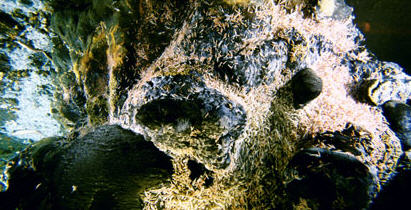IMAX theaters in several Southern cities have decided not to show a film on volcanoes out of concern that its references to evolution might offend those with fundamental religious beliefs. — Associated Press
I suppose the AP meant to say “fundamentalist,” since most people with fundamental religious beliefs, including the pope, believe in the theory of evolution. But what is more disturbing is that the theaters have made this decision simply because they are afraid someone might be offended. Not even a single protester needed to appear before the chilling effect of faith-based intolerance was felt.
Surely moviegoers deserve the right to decide for themselves what movies to see? “Volcanoes of the Deep Sea,” according to the AP, “makes a connection between human DNA and microbes inside undersea volcanoes.” It says that if life could evolve under such extreme circumstances, it might help us understand evolution all over the planet.
This is not a controversial opinion. The overwhelming majority of all scientists everywhere in the world who have studied the subject would agree with it. Although discussion continues about the mechanics of evolution, there is no reputable doubt about the existence of DNA and the way in which it functions.
Yes, there is “creationist science,” an attempt to provide a scientific footing for beliefs which should be a matter of faith. Creationists say evolution is “only a theory,” and want equal time for their theories, one of which is that God created the earth from scratch in six days, and rested on the seventh.
Evolution is indeed a theory. Creationism is a belief, not a theory. In science, a theory is a hypothesis that has withstood the test of time and the challenge of opposing views. It is not simply somebody’s notion about something. The creationist belief cannot withstand such tests and challenges; it exists outside the world of science altogether.
There is no conflict between a belief in Darwinism and a belief in God as the creator of the universe. Many scientists have no trouble with the idea that God was the creator of all that is. In evolution, they think they see the elegant way by which he caused suns and planets to form, matter to interact, and life to come into being; that over some 4 billion years, the Earth and the creatures on it gradually evolved into the world we occupy today.
Fundamentalism denies this majestic idea and substitutes God as a magician who created everything more or less as it is now, all at once or very quickly. Dinosaur bones, geologic strata and carbon dating, by providing evidence that seems to contradict their beliefs, are a test of faith.
Now we have theaters, school systems and the media asked to give equal footing to a theory based on science and a belief based on faith. Creationists want it both ways. They want their ideas introduced into schools, but (if IMAX is right) they do not want evolution included in movies about volcanoes. If they are right and can prove it, what do they have to fear?
An industry has grown up around the “science” supporting the “argument for intelligent design.” It refuses the possibility that evolution itself is the most elegant and plausible argument for those who wish to believe in intelligent design. If you are interested, you might want to go to www.talkorigins.org, where the errors of creationist science are patiently explained. And you might want to ask at your local IMAX theater why they allow a few of their customers to make decisions for all of the rest.












